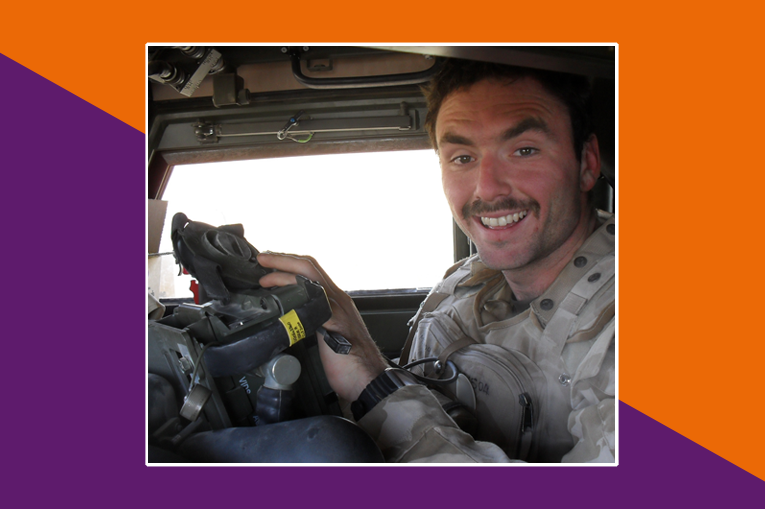Stu’s story

Stu Mendelson is the Veterans’ Lead at our Spectrum Service in Hertfordshire. Following a life-changing injury while on duty, he shares his experience of treatment at Tom Harrison House, the UK’s only residential rehabilitation service specifically for people who have served in the armed forces.
In 2009, I was serving with the Royal Engineers in Afghanistan when a Taliban IED hit my patrol. The blast cost me my right eye, and for several weeks I was completely blind. That kind of injury changes everything – but the damage that followed wasn’t just physical.
Within six months, I was out of the Army. No support. No counselling. No real transition. One day I was a soldier on operations, the next, a civilian with nothing. That drop was brutal and like far too many veterans, I fell hard.
The trauma didn’t stay overseas. It followed me home, got louder and more unpredictable. I began using cocaine, trying to quiet the noise in my head, I didn’t know then that I had PTSD and ADHD. I just knew I needed to shut it all out: cocaine gave me that escape, until it didn’t.
I reached out for help, contacting several established veteran charities, hoping to receive support, but when I admitted I had a cocaine addiction, they turned me away. That was the message: if you’re struggling with drugs, you’re not welcome. No one asked what I’d been through. No one looked beyond the label.
Everything got darker. I became more isolated, more chaotic, and eventually reached the point where I didn’t want to go on. I attempted to take my own life, and very nearly succeeded.
That should have been the end of my story. But instead, it became the start of something different.
A space to rebuild, and retrain
I was offered a fully funded placement at Tom Harrison House in Liverpool through Change Grow Live’s Spectrum Drug and Alcohol Recovery Service in Hertfordshire. Tom Harrison House provides a residential recovery programme for veterans and is the only one of its kind in the UK.
They understood me, not just as someone with an addiction, but as someone who had served, been injured and come back to a system that didn’t care. For the first time, I was treated as a whole person.
Recovery gave me the stability I needed. It gave me the space to rebuild, and after treatment, I trained and qualified as an equine therapist, working with veterans struggling with trauma and addiction at the place I had once been a client. The connection to the horses and the ability to give back gave me a sense of pride and purpose I hadn’t had since my time in the military.
Eventually, I started volunteering with Change Grow Live. I knew I wanted to work directly with veterans, and I knew how badly the system needed people who understood what it’s actually like: not theory, but lived experience.
A new veteran-specific pathway
Today, I work part-time for Change Grow Live in Hertfordshire. I’m a Veteran SMART Recovery facilitator, and I’ve helped develop a veteran-specific pathway within the service.
That pathway matters, because veterans don’t always respond to typical service models: we’re trained to suppress emotion, to push through, to keep going. That doesn’t just vanish when we leave the forces.
The pathway we’ve developed is about providing veteran-specific groups, ensuring that colleagues across Hertfordshire are aware of the additional support needs that veterans may have. This means colleagues can signpost people to organisations which can support them with veteran-specific needs, and – where appropriate – create a clear referral route to Tom Harrison House. It’s about making sure no veteran is left to navigate complex systems alone, and that colleagues working in services are equipped to respond with understanding, not judgement.
I’m part of Change Grow Live’s Veterans Task Force, where I help shape veteran policy across the wider organisation. We host a quarterly Veteran Support Working Group, which brings together colleagues passionate about supporting veterans, alongside external veteran organisations including our partners PTSD Resolution. It’s a space for collaboration, shared learning, and joined-up action to improve outcomes for the veteran community. I strongly encourage any colleagues reading this who are interested in veteran support to get involved and engage with the group, your contribution can make a real difference.
I’m proud of what we’re building at Change Grow Live, but I’ll keep pushing for more: more awareness, more access, and more willingness to listen. This is about saving lives, not ticking boxes.
If you’re a veteran who’s struggling, there is help. You’re not alone, and you’re not beyond hope. I know, because I’ve been where you are.
If you’d like to know more about the work that we’re doing to support veterans, we’d love to hear from you. You can reach the Veteran Support Working Group at: [email protected]
